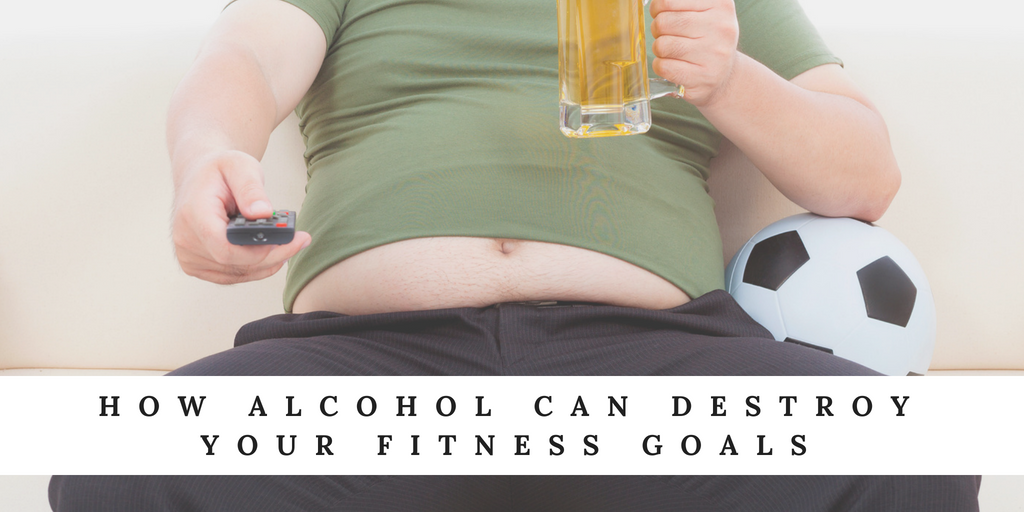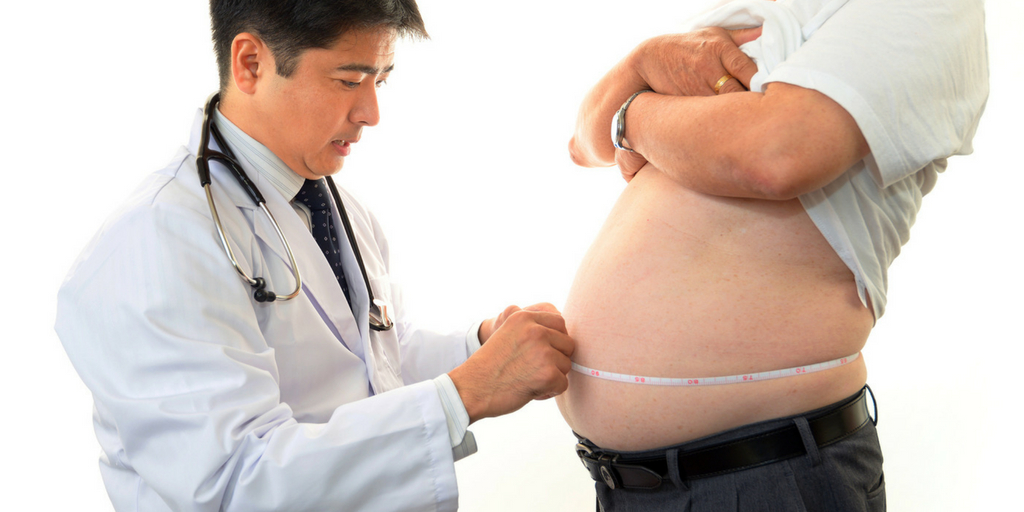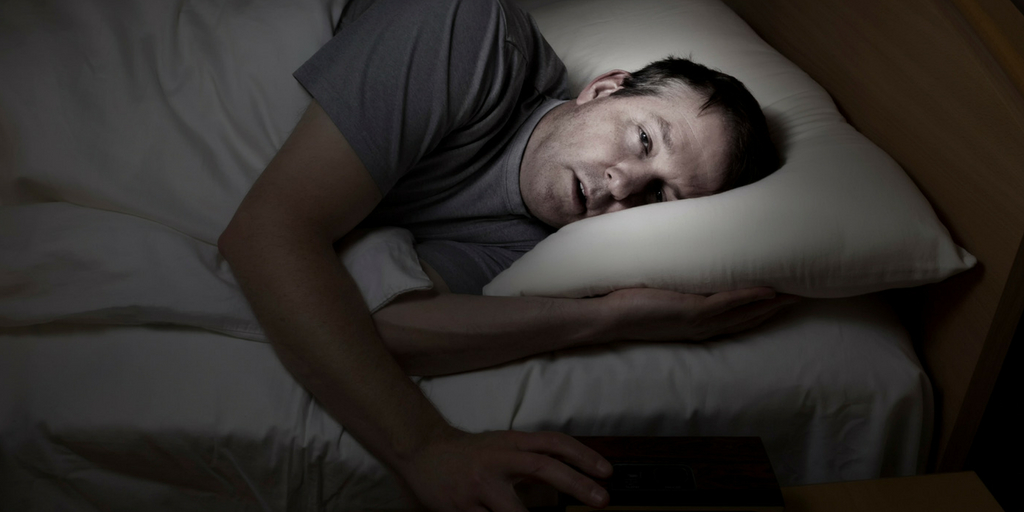How Alcohol Can Destroy Your Fitness Goals

It is no secret that alcohol isn't the best substance to be fueling our bodies with, but after completing a tiring workout or long week at work a night spent at happy hour often sounds like the perfect indulgence. T he question comes into play of how much havoc drinking can wreak on accomplishing, or maintaining our desired fitness goals?
The statistics are vital to consider, for no one wants to spend hours at the gym only to have all that hard work make no difference, or even cause an opposite effect due to drinking! Keep reading to find out why avoiding alcohol will keep you on your fitness track, and determine whether the choice to partake in drinking is worth it.
Alcoholic drinks are in general very high in calories, and not just any calories but empty calories that offer no nutritional value. On average, a 12-ounce beer contains roughly 150 calories, a glass of wine at 125 calories, and a shot of alcohol contains 100 calories. Mixed drinks, such as cocktails and margaritas are typically very sugary and have even more calories. After a night of drinking, these calories will accumulate very fast. When your body is taking in empty calories, there are no nutrients to be stored, therefore sending the alcohol straight to your liver, and ultimately affecting your metabolism. Instead of burning the fat already in your body, your liver must now process the alcohol that has been consumed. As a result of this, your body is less capable of breaking down the lunch you ate and begins storing the food's fat and carbs. If you are hoping to lose weight and shed off some extra fat, alcohol consumption can definitely disrupt this.

Drinking alcohol not only affects your bodies ability to break down fat, but it also causes dehydration. The reason alcohol dehydrates you is that it is classified as a diuretic, which is a substance that increases your frequency of having to go to the bathroom. Excessive drinking also increases the likelihood of your body rejecting these toxins, which results in vomiting and further dehydration. If you are working on your physique, you likely spend a decent amount of time exercising, and sweating which is already contributing to dehydration. Drinking on top of this, can put your body in a poor state, often accompanied by headaches, fatigue, or dizziness. Attempting to exercise while in a dehydrated state is not only dangerous but limits your abilities significantly, both mentally and physically.
After a night of drinking it’s likely not out of the ordinary to find yourself getting a pizza delivered or pigging out on the snacks and leftovers in your fridge. There is a reason behind this, as alcohol has a direct effect on increased levels of hunger. In fact, the receptors in your brain that create the urge to indulge in a meal are activated by the consumption of alcohol. The previously discussed component that consuming alcohol has zero nutritional value also plays an effect, for it doesn't fill you up, and leaves your body craving foods that will absorb these toxins. Not only are you hungry the night of the drinking, but this hunger continues the morning after as your body is trying to recuperate. Now you have found yourself not only facing all the calories brought on by drinking, but the additional calories supplied by the post-drinking snacks. Eating an additional greasy meal everytime you drink is without a doubt going to play a role in failing to reach your peak fitness abilities.

Whether you wake up with a hangover the morning after drinking or not, your body likely experienced adverse effects of alcohol while you slept. Alcohol has a significant impact on your bodies ability to get a full, well-rested nights sleep. As discussed you are consuming a diuretic, and therefore the likelihood of waking in the night to make trips to the bathroom significantly raises. Even if you are not waking up in the night, alcohol affects your ability to fall into REM, which is your deepest, best stage of sleep. Even though you may feel exhausted after a night of drinking and quickly fall asleep, the actual quality of this sleep is impacted. Keeping up with your exercise routine after a night of disrupted sleep will be much more difficult.
Not only will your energy levels be down due to lack of quality of sleep, but if a hangover accompanies your morning after drinking, you will experience feelings of nausea, muscle pain, dehydration, headaches, and weakness. Maintaining motivation to go to the gym or go on a run will feel impossible under these circumstances. On top of this, working out will not help relieve the hangover symptoms you are feeling; instead, you will just feel exhausted and likely have little productivity. If you want to avoid a hangover, carb up before you start drinking, drink water in between drinks, and eat a nutritious breakfast the following morning.

Excessive amounts of alcohol intake have been proven to lower testosterone levels in men, resulting not only in low energy but reduced muscle growth. The higher levels of testosterone men have, the easier it is to build muscle, and therefore if you are working on become more fit you want the most testosterone possible. It has also been said that the lower the level of testosterone the higher the percentage of body fat one has. The process known as protein synthesis, where your body builds protein cells which leads to muscle development, is disrupted and decreased by the consumption of alcohol. When building muscle you do not necessarily have to eliminate alcohol consumption from your life completely, but keeping your drinking habits to a minimal amount will guarantee much better results.
While alcohol consumption has been shown to affect your exterior fitness and health goals, such as limiting muscle production and weight loss, it also affects your body internally. While alcohol in small, reasonable amounts is said to reduce the possibility of developing heart disease, drinking in excess quantities is known to have opposite effects. Alcohol increases your heart rate and can contribute to the development of an irregular heartbeat. Exercising with an irregular heartbeat may amount to a stressful situation if it is something you have never experienced before. If your health is deteriorating due to excessive drinking, symptoms will only continue to get worse and put you at risk for potential disaster.
Now that you have been exposed to the effects regular drinking plays on attaining your fitness goals and desires, you can evaluate how much drinking you feel is appropriate. If you want to achieve sobriety but are struggling to put drinking behind you , there is help out there for you. Seek alcohol treatment today and get your fitness goals back on track.
Matthew Boyle is the Chief Operating Officer at Landmark Recovery , a top-rated drug and alcohol treatment center in the midwestern United States. He has been working in the healthcare space for 7 years and graduated from Duke University in 2011 Summa Cum Laude. Guided by a relentless pursuit of excellence, Matthew and the team at Landmark are dedicated to creating a supportive environment for recovery and fulfilling the vision of saving 1 million lives in 100 years.
The statistics are vital to consider, for no one wants to spend hours at the gym only to have all that hard work make no difference, or even cause an opposite effect due to drinking! Keep reading to find out why avoiding alcohol will keep you on your fitness track, and determine whether the choice to partake in drinking is worth it.
The 7 Ways Alcohol Could be Sabotaging Your Health and Fitness Goals
Alcohol affects your metabolism
Alcoholic drinks are in general very high in calories, and not just any calories but empty calories that offer no nutritional value. On average, a 12-ounce beer contains roughly 150 calories, a glass of wine at 125 calories, and a shot of alcohol contains 100 calories. Mixed drinks, such as cocktails and margaritas are typically very sugary and have even more calories. After a night of drinking, these calories will accumulate very fast. When your body is taking in empty calories, there are no nutrients to be stored, therefore sending the alcohol straight to your liver, and ultimately affecting your metabolism. Instead of burning the fat already in your body, your liver must now process the alcohol that has been consumed. As a result of this, your body is less capable of breaking down the lunch you ate and begins storing the food's fat and carbs. If you are hoping to lose weight and shed off some extra fat, alcohol consumption can definitely disrupt this.

Alcohol dehydrates your body
Drinking alcohol not only affects your bodies ability to break down fat, but it also causes dehydration. The reason alcohol dehydrates you is that it is classified as a diuretic, which is a substance that increases your frequency of having to go to the bathroom. Excessive drinking also increases the likelihood of your body rejecting these toxins, which results in vomiting and further dehydration. If you are working on your physique, you likely spend a decent amount of time exercising, and sweating which is already contributing to dehydration. Drinking on top of this, can put your body in a poor state, often accompanied by headaches, fatigue, or dizziness. Attempting to exercise while in a dehydrated state is not only dangerous but limits your abilities significantly, both mentally and physically.
Alcohol leads to snacking
After a night of drinking it’s likely not out of the ordinary to find yourself getting a pizza delivered or pigging out on the snacks and leftovers in your fridge. There is a reason behind this, as alcohol has a direct effect on increased levels of hunger. In fact, the receptors in your brain that create the urge to indulge in a meal are activated by the consumption of alcohol. The previously discussed component that consuming alcohol has zero nutritional value also plays an effect, for it doesn't fill you up, and leaves your body craving foods that will absorb these toxins. Not only are you hungry the night of the drinking, but this hunger continues the morning after as your body is trying to recuperate. Now you have found yourself not only facing all the calories brought on by drinking, but the additional calories supplied by the post-drinking snacks. Eating an additional greasy meal everytime you drink is without a doubt going to play a role in failing to reach your peak fitness abilities.

Alcohol affects your quality of sleep
Whether you wake up with a hangover the morning after drinking or not, your body likely experienced adverse effects of alcohol while you slept. Alcohol has a significant impact on your bodies ability to get a full, well-rested nights sleep. As discussed you are consuming a diuretic, and therefore the likelihood of waking in the night to make trips to the bathroom significantly raises. Even if you are not waking up in the night, alcohol affects your ability to fall into REM, which is your deepest, best stage of sleep. Even though you may feel exhausted after a night of drinking and quickly fall asleep, the actual quality of this sleep is impacted. Keeping up with your exercise routine after a night of disrupted sleep will be much more difficult.
Alcohol lowers your (sex) drive
Not only will your energy levels be down due to lack of quality of sleep, but if a hangover accompanies your morning after drinking, you will experience feelings of nausea, muscle pain, dehydration, headaches, and weakness. Maintaining motivation to go to the gym or go on a run will feel impossible under these circumstances. On top of this, working out will not help relieve the hangover symptoms you are feeling; instead, you will just feel exhausted and likely have little productivity. If you want to avoid a hangover, carb up before you start drinking, drink water in between drinks, and eat a nutritious breakfast the following morning.

Alcohol affects your hormones
Excessive amounts of alcohol intake have been proven to lower testosterone levels in men, resulting not only in low energy but reduced muscle growth. The higher levels of testosterone men have, the easier it is to build muscle, and therefore if you are working on become more fit you want the most testosterone possible. It has also been said that the lower the level of testosterone the higher the percentage of body fat one has. The process known as protein synthesis, where your body builds protein cells which leads to muscle development, is disrupted and decreased by the consumption of alcohol. When building muscle you do not necessarily have to eliminate alcohol consumption from your life completely, but keeping your drinking habits to a minimal amount will guarantee much better results.
Heart health is affected
While alcohol consumption has been shown to affect your exterior fitness and health goals, such as limiting muscle production and weight loss, it also affects your body internally. While alcohol in small, reasonable amounts is said to reduce the possibility of developing heart disease, drinking in excess quantities is known to have opposite effects. Alcohol increases your heart rate and can contribute to the development of an irregular heartbeat. Exercising with an irregular heartbeat may amount to a stressful situation if it is something you have never experienced before. If your health is deteriorating due to excessive drinking, symptoms will only continue to get worse and put you at risk for potential disaster.
Next steps
Now that you have been exposed to the effects regular drinking plays on attaining your fitness goals and desires, you can evaluate how much drinking you feel is appropriate. If you want to achieve sobriety but are struggling to put drinking behind you , there is help out there for you. Seek alcohol treatment today and get your fitness goals back on track.
 Author Bio:
Author Bio:
Matthew Boyle, COO @ Landmark Recovery
Matthew Boyle is the Chief Operating Officer at Landmark Recovery , a top-rated drug and alcohol treatment center in the midwestern United States. He has been working in the healthcare space for 7 years and graduated from Duke University in 2011 Summa Cum Laude. Guided by a relentless pursuit of excellence, Matthew and the team at Landmark are dedicated to creating a supportive environment for recovery and fulfilling the vision of saving 1 million lives in 100 years.




































































































